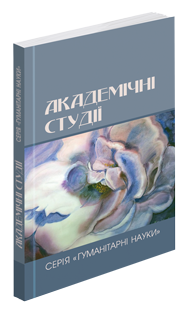Abstract
The article considers the instrumental case as a representative of the semantic-syntactic sphere of other case forms. It is determined that the semantic-syntactic contours of the instrumental case can shift and become more capacious, since it is located in the secondary proper-case object, subject or locative spheres. It is found that in such constructions the analyzed gramme, in addition to instrumentality, acquires a different meaning and semantically approaches to the accusative, nominative and locative cases. The instrumental rarely participates in object transposition. The instrumental case of an object can be included in the valence frame of predicates of action, state and qualitative feature. A mandatory condition for functioning of the instrumental case is its presence within the semantic-syntactic valence of verb predicates with the meaning of leadership, possession. It is outlined that in the grammatical system of the modern Ukrainian literary language, the instrumental case is a productive means of expressing the subjective syntax, therefore, the specified gramme is connected by transformational relations with the nominative case of two-component sentences. The functioning of another type of sentence structures with the instrumental subjective is indicated, that is, passive constructions with the gramme of the instrumental, in which the semantics of instrumentality is strengthened. It is characterized that, in addition to the secondary objective and subjective meanings, the instrumental case functions as a component that depends on action-locative predicates. The case form of the instrumental, in addition to the primary one, plays the role of a secondary representative. This phenomenon is related to internal grammatic transposition, the comprehensive study of which is increasingly reflected in modern functionally oriented studies.
References
Безпояско О. К. Іменні граматичні категорії (Функціональний аналіз). Київ : Наукова думка, 1991. 172 с.
Габай А. Ю. Синтаксична прислівникова транспозиція відмінкових і прийменниково-відмінкових форм : автореф. дис. … канд. філол. наук : спец. 10.02.01 «Українська мова». Київ, 2010. 18, [2] с.
Вихованець І. Р. Теоретична морфологія української мови : академічна граматика української мови / заг. ред. І. Вихованець. Київ : Унів. вид-во «Пульсари», 2004. 398, [2] с.
Костусяк Н. М. Формально-синтаксичні та комунікативні ознаки орудного відмінка як засобу вираження зовнішньої синтаксичної транспозиції. IV Міжнародні севастопольські Кирило-Мефодіївські читання. Севастополь : Гит пак, 2010. Т. I. С. 123–132.
Мірченко М. В. Структура синтаксичних категорій. 2-е вид., переробл. Луцьк : РВВ «Вежа» Волин. держ. ун-ту ім. Лесі Українки, 2004. 393 с.
Плющ М. Я. Категорія відмінка в семантико-синтаксичній структурі речення. Київ : Вид-во Національного педагогічного ун-ту імені М. П. Драгоманова, 2016. 252 с.
Тесліцька Г. І. Структурно-семантична типологія напівпредикативних ад’єктивних компонентів у простому ускладненому реченні. Закарпатські філологічні студії. Вип. 23. Т. 2. Ужгород : Видавничий дім «Гельветика», 2022. С. 64–67. URL : http://zfs-journal.uzhnu.uz.ua/archive/23/part_2/11.pdf (дата звернення: 09.11.2024).

